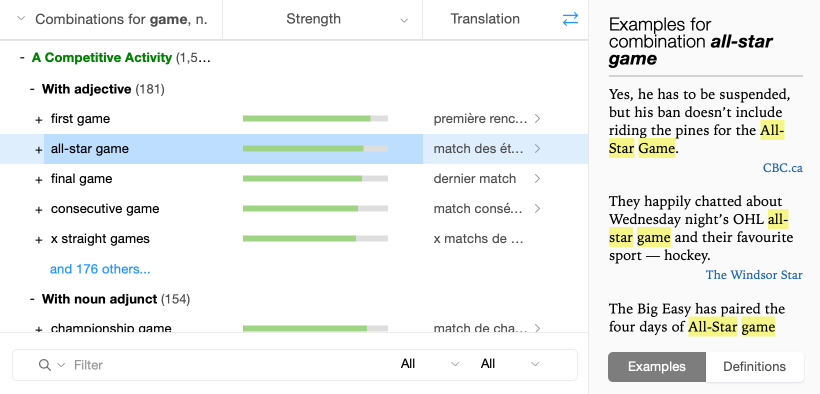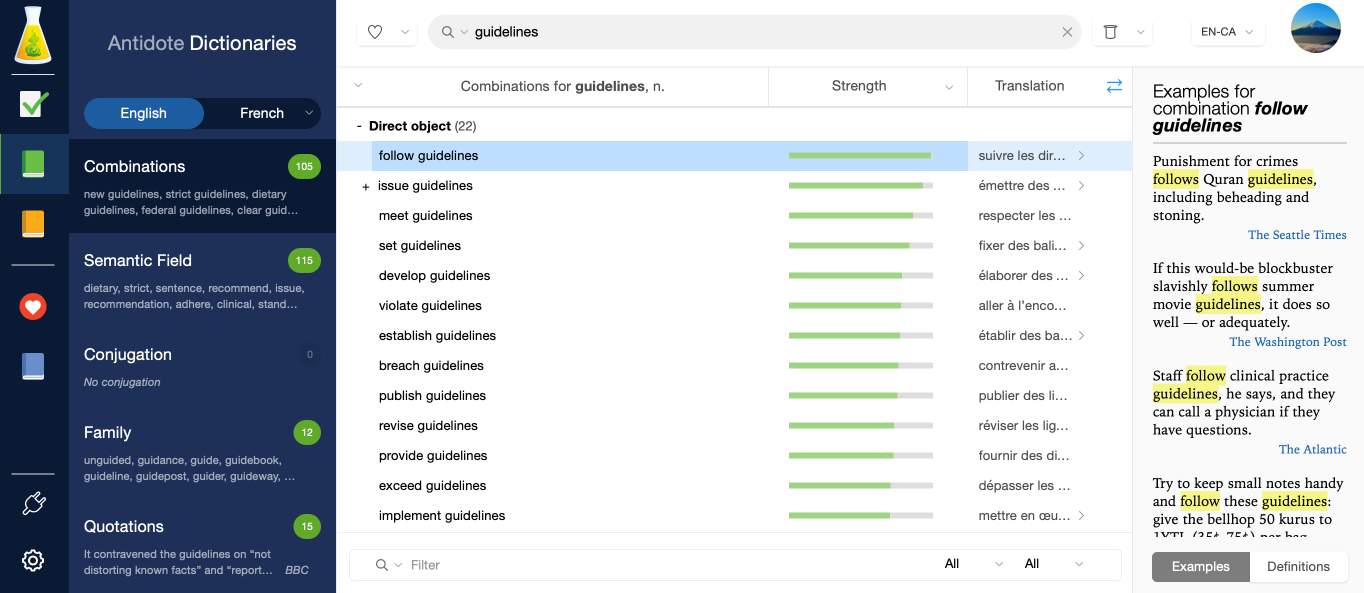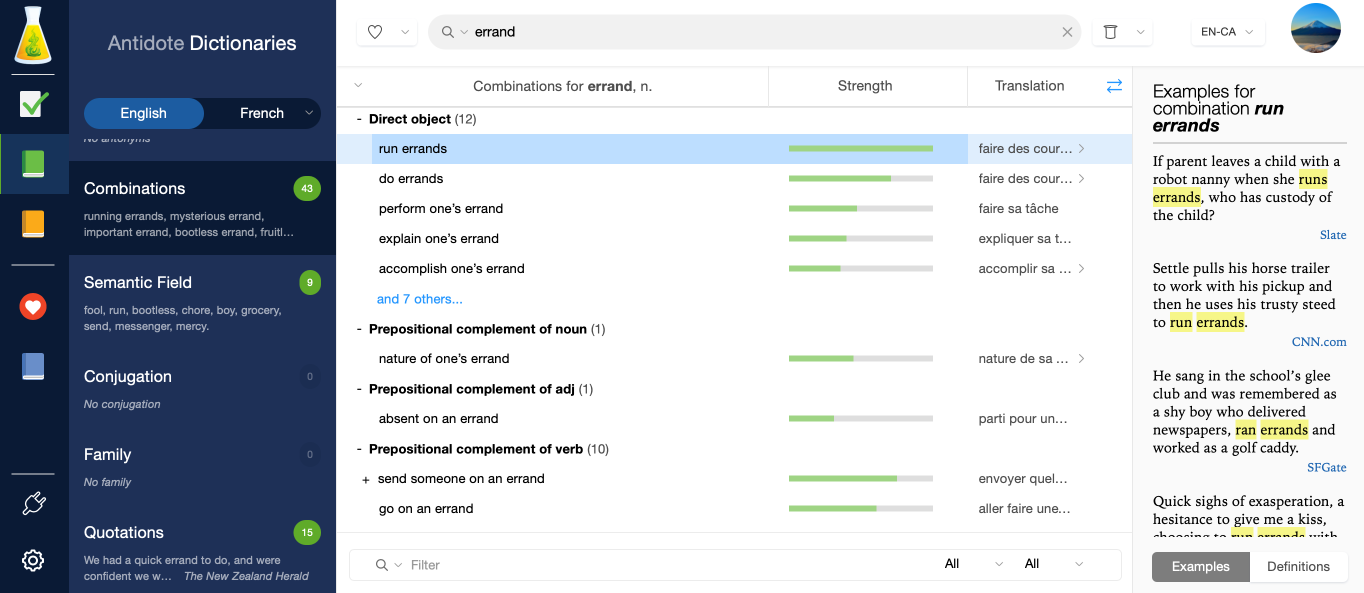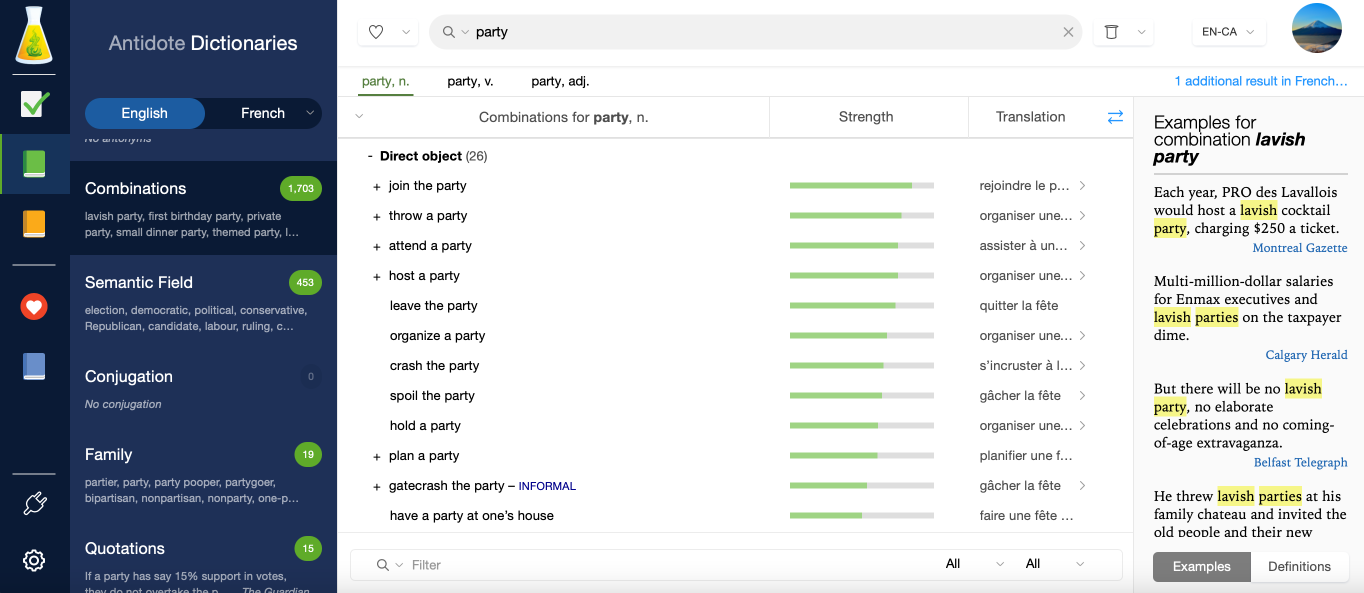Find the Right Word, With Combinations

You’re probably familiar with Antidote’s resources, but are you getting the most out of them? In the second of our new series of articles, “Find the Right Word,” we introduce you to the dictionary of combinations. Although sometimes overlooked, this tool is a firm favourite with those in the know. Read on to find out why.
SERIES — Find the Right Word
What is a Combination?
In linguistics, combinations are pairs or small groups of words that frequently occur together in the corpus. More specifically, they reflect the usual or preferred association between two words, such as in the expressions solid gold, flatly refuse or conduct research.
The word combination comes from the Latin combinare, “to join two things together.” We can therefore describe them as words that commonly appear side by side.
Antidote’s Dictionary of Combinations
Our dictionary of combinations gives all the most significant lexical combinations of a word—that is, the combinations with a strong, frequent and spontaneous association in the language. They are grouped by the headword’s various meanings, if applicable, then by syntactic context (with adjective, with noun adjunct, with possessive etc.) and finally by the strength of the combination. The dictionary includes a total of 700,000 combinations, all accompanied by example sentences.
Hover over the numbered bullet points to explore the dictionary’s interface, which is shown here in Antidote Web.
-
 1234
1234
Our Tricks for Fast, Effective Writing with Combinations
Choose the Most Frequent Form.
To make your message as clear as possible, or simply to avoid headaches, you might sometimes want to find the most common usage. That’s easy! This combination is shown at the top of the list. For example, we run an errand more than we do an errand, even though both are correct and synonymous.
Avoid Incorrect Usage.
Gallicisms and other examples of incorrect usage are common in spoken language, so you might find yourself in doubt when it comes to writing them. For example, do we respect the guidelines or follow the guidelines? Instead of searching for the definitions of each verb in turn, simply type guidelines into the dictionary of combinations. Only the correct version is displayed!

Do we say forge a document or fake a document? In this case, the answer isn’t immediately visible. Go to the bottom of the window and type a few letters into the text filter. All you need is “forg” or “fak” to find the answer!

You can also use the combinations to find the correct preposition. Sometimes it’s the smallest words that catch us out! So, do we cater to or cater for all your linguistic needs?

Avoid Commonplace Verbs.
The Antidote corrector underlines commonplace verbs (Style view > Vocabulary), such as the verb to have in “We’re going to have a party next weekend.” The dictionary of combinations is a goldmine for more creative ideas! To throw, to hold, to organize—the choice is yours.
Consult Definitions Without Leaving the List.
Selecting a combination gives you access, in the right-hand panel, to examples of the combination in real texts, along with references. And, as in the dictionary of synonyms, you can consult the definition of the main word in the selected combination without leaving the list. Simply click on the Definitions button underneath the examples. When it’s that easy to check the meaning, you can be sure you’re using the best choice of word!
Look to the Filters for Inspiration.
Short on ideas? Can’t find the words for an email? Browse the combinations to breathe new life into your text. Filters are especially helpful for this, and you can find them at the bottom of the window (underneath the Options button in Antidote 10). Apply filters to display only the combinations with a positive or negative value, or those with a strong or weak meaning. For example, if you want to describe beautiful flowers, use the filter to remove any negative values, such as wilted flowers.

The meaning filter sorts combinations into different intensities. If you’re looking for an adverb to go with the word increase, the strong filter suggests drastically increase, while the weak filter gives you potentially increase.

All in all, you’ll soon find the dictionary of combinations to be an essential tool—whether you’re looking for the perfect adjective, the appropriate verb or the most evocative adverb for your text. Check out the Antidote User Guide for all the details.
In the next article in our “Find the Right Word” series, we will dive into the advanced research functions. These allow you to draw on the Antidote dictionaries like a database and discover words you never knew existed.
Get the latest edition of Antidote!
Visit the web store





